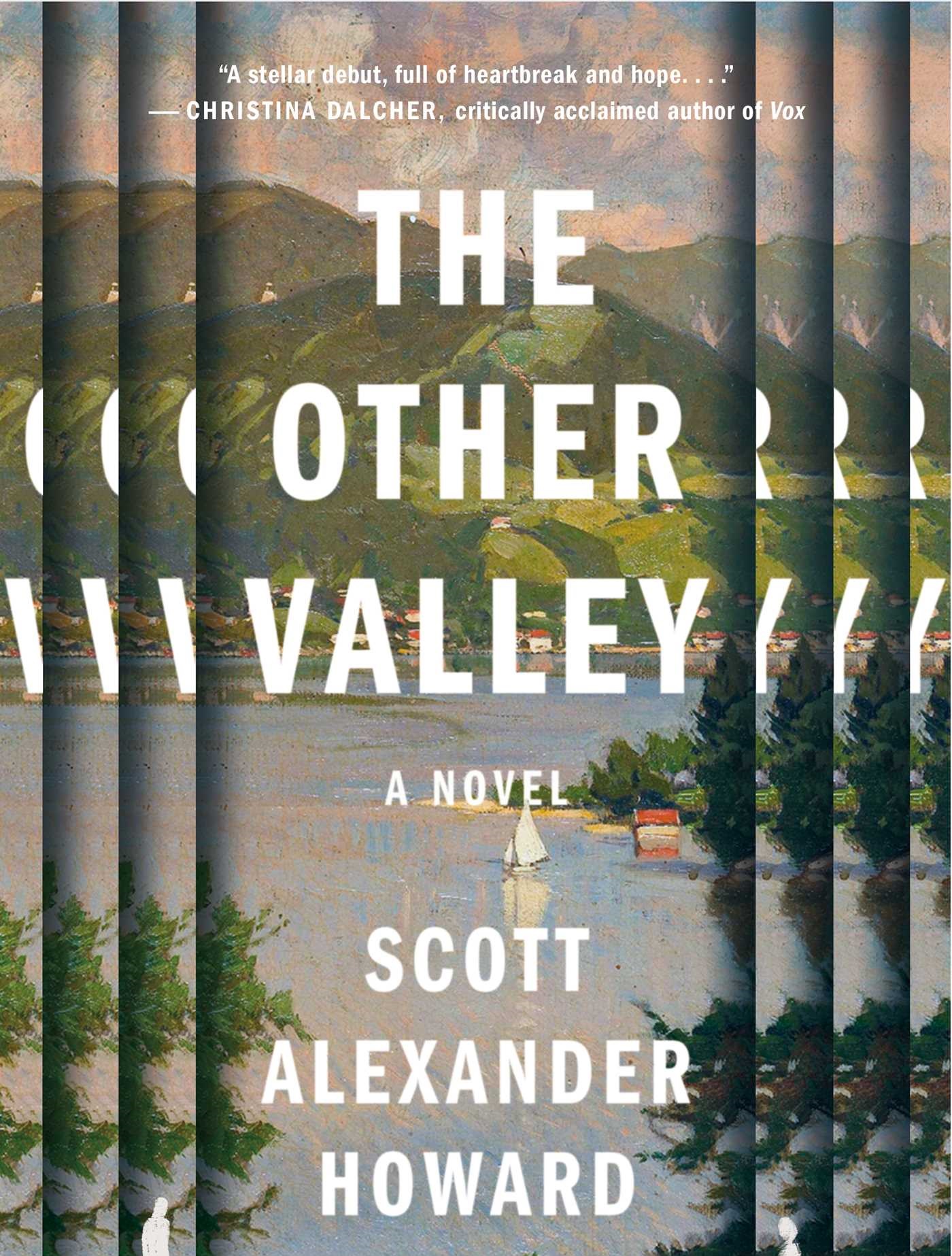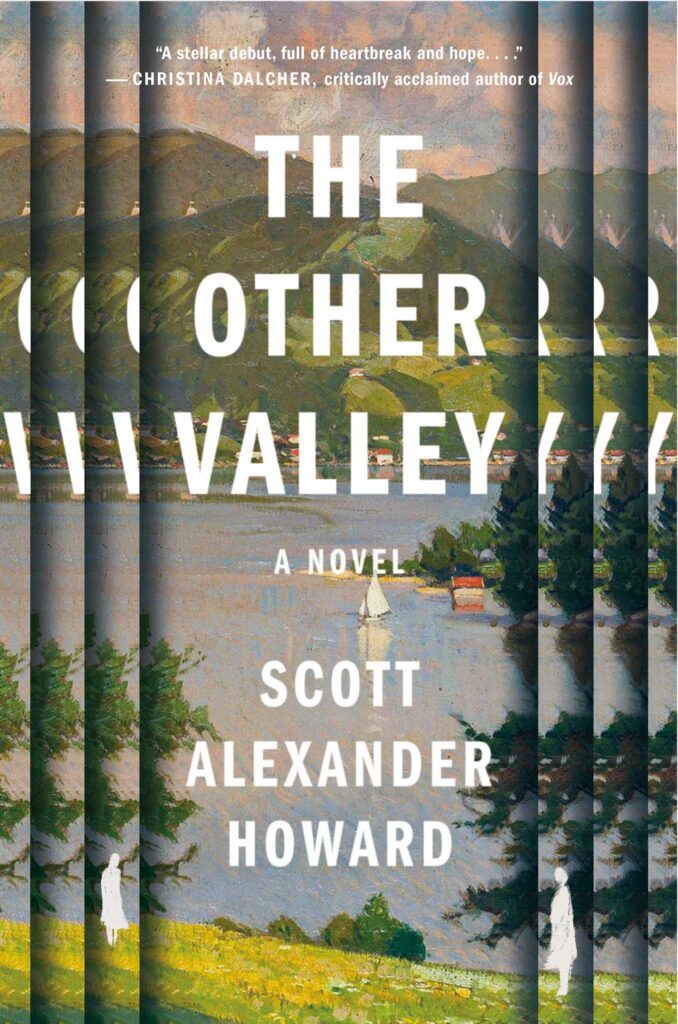
A Review of The Other Valley by Scott Alexander Howard
Words By Zara Garcia
*SPOILER ALERT* This review contains plot details about The Other Valley.
Published February 2024 by Atria Books.
In a world where the layers of time must coexist simultaneously, Odile Ozanne faces a choice that could rewrite the future or seal her friend’s fate in the past.
Scott Alexander Howard’s debut, The Other Valley, is a captivating speculative-fiction novel nuanced with philosophical questions about the delicate balance of time and the nature of free will. The first half is a coming-of-age story complicated by secrecy and moral turmoil. Odile is a clever and introverted sixteen-year-old who resides within a valley nestled amidst an array of identical, repeating valleys. To her east lies a valley twenty years ahead in time, while the valley to the west is twenty years in the past. The exclusive authority to grant passage across their guarded borders rests with the Conseil, which Odile is on the verge of joining as an apprentice. When two visitors from the future come to Odile’s valley on a mourning tour, she recognizes them as the parents of her cherished friend, Edme. Odile is left at a crossroads with her mind and heart divided. Should she keep this knowledge a secret, preserving the integrity of the timeline? Or should she risk warning Edme, whose impending doom inches closer every day? As her bond with Edme deepens, the weight of her moral dilemma grows heavier, casting a dark shadow on her destiny.
Howard’s storytelling is marked by his deft use of Odile as the first-person narrator. Narrowing in on Odile’s coming-of-age narrative, Harold seamlessly eases readers into the speculative realm of the novel. He opts for a gentle immersion that begins with mundane aspects of the story, rather than a jarring, action-packed scene. I appreciated this approach because it set the tone for a more dimensional narrative to unfold at a measured pace alongside Odile’s character growth.
The novel begins in Odile’s school as she stands at the precipice of transitioning into the workforce. The last school year marks the apprenticeship level, during which students apply to different vocations. It isn’t until her teacher, Pichegru, instructs her to write an essay to earn a spot in the Conseil’s vetting program that the speculative nature of the story comes to light. Pichegru asks, “If you had permission to travel outside the valley, which direction would you go?” This question becomes the gateway to Howard’s intricate exploration of a world where everyday citizens, despite their awareness of neighboring valleys, remain bound by cautionary folklore that deters them from venturing out. Odile’s journey slowly unveils the enigma shrouding the valleys and sheds light on the Conseil’s vital role in safeguarding reality. As she learns more about her world and strives to find a place within it, I was increasingly lured into the narrative and the mounting gravity of her situation.

I was most impressed by Howard’s remarkable talent for crafting a heart-wrenching narrative that masterfully explores metaphysical quandaries. He builds a world that lays bare the fragility of reality and identity. This metaphysical contemplation shines through the Conseil’s vetting program, where Howard’s background in philosophy comes to life in the character of Ivret, Odile’s mentor. Her eloquent explanations provide profound insight into the perils of tampering with the valley to the west. Interfering with the past does not create simple absences in the present valley, rather, whole existences and facts are undone and rewritten. Howard writes, “A person goes west, he interferes, and then time rolls over him like a wave, leaving nothing behind.”
Intriguingly, visitation to the other valleys is allowed, but gaining approval from the Conseil is difficult. Guided by Ivret, Odile and her peers grapple with a series of tests in which they approve or deny mock visitation requests. Their decisions must balance compassion for human grief while weighing the risk of the bereaved potentially tampering with the past or future. Ethical dilemmas persist beyond the vetting program, allowing the theme of morality to remain present throughout the novel. I felt the Conseil’s presence served to underscore a utilitarian perspective prioritizing the welfare of the majority over the happiness of an individual. However, Howard also evokes empathy for characters who prioritize their personal interests over the greater good. He further pushes the boundaries of morality by suggesting that those put in harm’s way through the tampering of time might be erased from existence. I found myself contemplating whether the immorality of their actions could be excused if those affected never truly existed in the first place.
The second half of the novel follows Odile in her mid-thirties. The narrative sharply shifts from the optimism of her adolescence to a more somber tone, revealing the stark disparity between the life she had hoped for and the bleak reality she faces. I wish that Howard had offered a smoother transition, as there is no immediate explanation for the position Odile finds herself in. I had to resist the temptation to peek ahead for signs of her youthful self returning because I couldn’t accept that the promising sixteen-year-old we initially encountered was gone so suddenly. I mourned the loss of Odile’s hopefulness and innocence, finding it difficult to adjust to her colder perspective as an adult. The transition, while frustrating, proves necessary to lend her character greater depth. As the novel progressed, I realized that Odile’s emotional detachment was her coping mechanism for regret and the consequences of her past choices. However, just as she begins to accept her circumstances, she reconnects with old friends and sets forth on a path that surpasses her wildest imagination.
The stakes presented in Howard’s novel are undeniably unsettling and beckon readers to ponder weighty philosophical questions. As Odile struggles with a choice that could rewrite the lives of everyone in her valley, Howard leads the reader through a narrative that compellingly explores the intersection of fate and free will. The Other Valley is an enthralling emotional and intellectual journey that lingers past the final page.